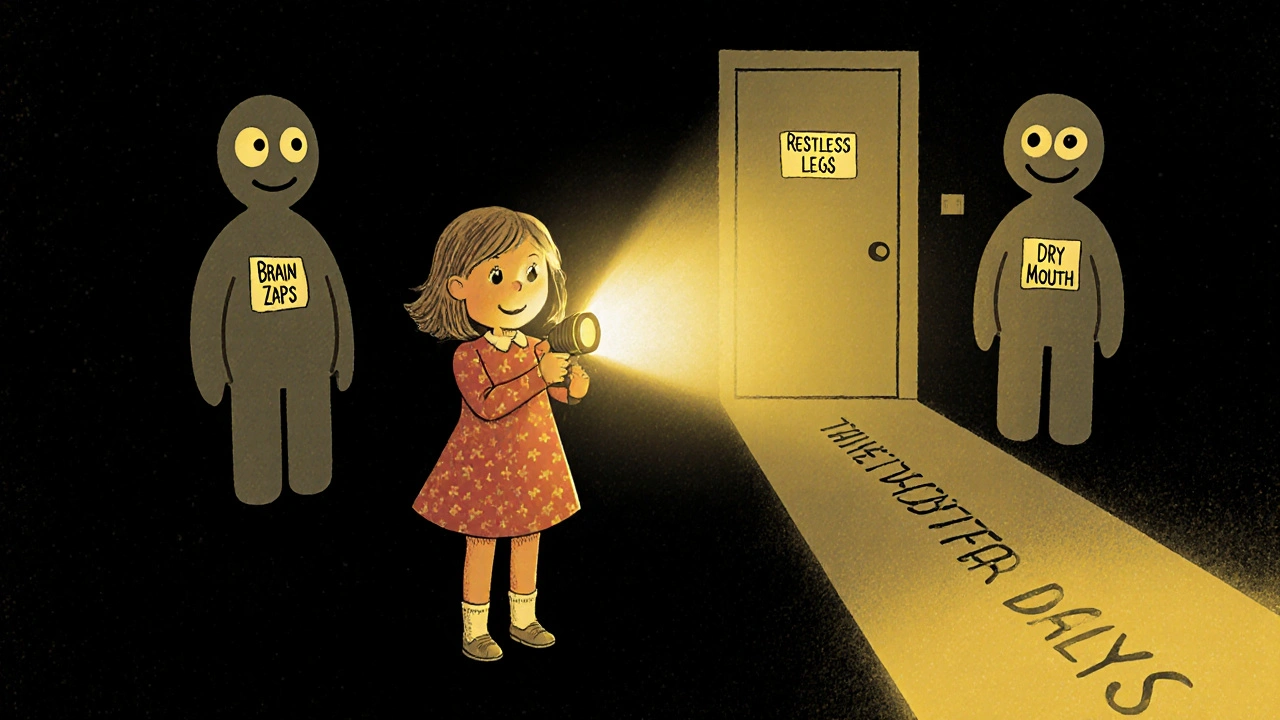SSRI Side Effect Estimator
SSRI Side Effect Estimator
Estimate your risk of side effects based on the SSRI you're taking. This tool uses data from clinical studies to provide realistic expectations.
When you start taking an SSRI for depression or anxiety, you’re not just hoping for better moods-you’re also signing up for a list of possible side effects. Some are mild, some are annoying, and a few can be serious. The truth? Almost 9 out of 10 people on SSRIs experience at least one side effect. And for more than half, those side effects are bad enough to make them question whether the medication is worth it.
What Are SSRIs, Really?
SSRIs-Selective Serotonin Reuptake Inhibitors-are the most common type of antidepressant prescribed today. They include drugs like sertraline (Zoloft), fluoxetine (Prozac), escitalopram (Lexapro), and paroxetine (Paxil). These medications work by blocking the brain from reabsorbing serotonin, the chemical linked to mood, sleep, and appetite. More serotonin in the space between nerve cells helps stabilize emotions. That’s the theory, anyway. But the brain doesn’t adjust overnight. In the first few days, your body reacts to the sudden serotonin surge. That’s when most side effects kick in. And they don’t always go away.Mild Side Effects: The Most Common Ones
Most people on SSRIs get hit with mild side effects early on. These aren’t dangerous, but they can make daily life harder.- Nausea-This is the #1 complaint. About half of people feel queasy in the first week. Taking the pill with food cuts it by nearly half.
- Drowsiness or insomnia-Some feel wiped out; others can’t sleep. Timing matters: taking it in the morning helps with sleep issues, but if you’re tired all day, switching to nighttime might help.
- Dry mouth-Simple, annoying, and often ignored. Sipping water or chewing sugar-free gum helps.
- Headache-Usually fades within two weeks. Over-the-counter painkillers like acetaminophen usually fix it.
- Dizziness-Especially when standing up fast. Slow movements help. This often improves in 2-4 weeks.
The Big One: Sexual Dysfunction
If you’re on an SSRI long-term, sexual side effects are the most likely to stick around. Up to 70% of people report them. That’s not a small number-it’s the majority.- Men: trouble getting or keeping an erection, delayed or absent ejaculation
- Women: reduced libido, trouble reaching orgasm
Weight Gain: Not Just in Your Head
People think weight gain on SSRIs is just from emotional eating. But studies show it’s more than that. SSRIs affect appetite centers in the brain and may slow metabolism over time.- 49% of users report weight gain
- Paroxetine and mirtazapine (not an SSRI, but often compared) cause the most
- Fluoxetine and sertraline tend to cause less

Severe Side Effects: When to Worry
Most side effects fade. But a few need immediate attention.Serotonin Syndrome
This is rare but dangerous. It happens when serotonin builds up too much-usually from mixing SSRIs with other drugs like tramadol, certain painkillers, St. John’s Wort, or even some cough syrups. Symptoms:- Fast heartbeat
- Sweating, shivering
- Muscle twitching or rigidity
- High fever
- Confusion or hallucinations
Hyponatremia (Low Sodium)
This is more common than you think-especially in older adults. SSRIs can make your body hold onto too much water, diluting sodium in your blood. Risk factors:- Age over 65
- Female gender
- Low body weight
- Already taking diuretics or blood pressure meds
Extrapyramidal Symptoms (EPS)
These are movement disorders that can mimic Parkinson’s:- Akathisia: constant restlessness, pacing, inability to sit still
- Dystonia: painful muscle spasms, especially in the neck or eyes
- Parkinsonism: tremors, stiff muscles, slow movement
Severe Skin Reactions
Stevens-Johnson syndrome and toxic epidermal necrolysis are rare but life-threatening. They start with flu-like symptoms and a spreading rash. If you get a painful red rash, blisters, or peeling skin, stop the SSRI and get help immediately.Discontinuation Syndrome: Quitting Too Fast
You can’t just stop SSRIs cold turkey. Even if you feel fine, your brain has adapted to the extra serotonin. When you stop suddenly, you get withdrawal symptoms. Common signs:- Dizziness
- Nausea
- Flu-like symptoms
- Electric shock sensations (“brain zaps”)
- Anxiety, irritability
Why Some SSRIs Are Easier to Tolerate Than Others
Not all SSRIs are the same. Here’s how they stack up in real-world tolerability:| SSRI | Best For | Worst Side Effects | Discontinuation Risk |
|---|---|---|---|
| Citalopram | General use, low side effect burden | Heart rhythm changes at high doses | Low |
| Fluoxetine (Prozac) | Long-term use, once-weekly dosing | Insomnia, weight gain | Low |
| Sertraline (Zoloft) | Anxiety + depression | Diarrhea, decreased appetite | Low |
| Escitalopram (Lexapro) | High efficacy, fewer GI issues | Dizziness, memory fog | Low |
| Paroxetine (Paxil) | Severe anxiety | Sexual dysfunction, weight gain, drowsiness | High |
| Fluvoxamine | OCD | GI upset, insomnia, drug interactions | Very high |

What’s New in 2025?
Research is moving fast. In June 2023, the FDA updated labels for all SSRIs to warn about increased risk of insulin resistance and type 2 diabetes with long-term use. A 2023 study found a 24% higher relative risk compared to other antidepressants. Also, new genetic tests can now predict who’s more likely to develop sexual side effects or weight gain. Some clinics are using them to pick the right SSRI before you even start. And new drugs are coming. Lu AF35700, currently in Phase III trials, cuts sexual side effects by 37% compared to traditional SSRIs. It could be available by 2027.How to Handle Side Effects: Practical Tips
You don’t have to suffer. Here’s what actually works:- Nausea? Take the pill with food. Most people see improvement in 2-3 weeks.
- Insomnia? Take it in the morning. Avoid caffeine after noon.
- Sexual problems? Talk to your doctor. Dose reduction, bupropion, or sildenafil can help. Don’t just quit.
- Weight gain? Start a walking routine and track calories. Even small changes help.
- Brain zaps? Don’t stop suddenly. Taper slowly.
- Feeling worse at first? That’s normal. It often takes 4-6 weeks to feel better. Side effects usually fade faster.
When to Switch or Stop
You’re not stuck with the first SSRI you try. About 31% of people quit their first one within three months because of side effects. That’s not failure-it’s normal. Consider switching if:- Side effects last longer than 6 weeks
- Sexual dysfunction doesn’t improve
- You’re gaining weight rapidly
- You have signs of serotonin syndrome or hyponatremia
Bottom Line
SSRIs work. But they’re not magic pills. They come with trade-offs. The key is knowing what to expect, when to worry, and how to manage it. Most side effects fade. But if one sticks around-especially sexual dysfunction, weight gain, or movement issues-don’t ignore it. Talk to your doctor. There are options. You don’t have to live with side effects that ruin your quality of life. The goal isn’t just to feel less depressed. It’s to feel like yourself again. And that means managing the full picture-not just the mood, but the body too.Do SSRI side effects go away on their own?
Yes, most mild side effects like nausea, dizziness, and headache improve within 2-6 weeks as your body adjusts. But some-like sexual dysfunction and weight gain-can persist. If they last longer than 6 weeks or get worse, talk to your doctor. You may need a dose change or a different medication.
Which SSRI has the least side effects?
Citalopram and fluoxetine are generally the best tolerated. Citalopram has fewer gastrointestinal issues and less sexual side effects than paroxetine or fluvoxamine. Fluoxetine has a long half-life, so withdrawal is milder. Sertraline is also well-tolerated for many, though it can cause diarrhea or decreased appetite early on.
Can SSRIs cause permanent side effects?
In rare cases, yes. Persistent sexual dysfunction (PSSD) has been reported even after stopping SSRIs, though it’s not common. Extrapyramidal symptoms like tardive dyskinesia can also become permanent if not caught early. The risk is low, but it’s real. Always report unusual symptoms early.
Is weight gain on SSRIs reversible?
Often, yes. A 2023 meta-analysis showed that patients who combined SSRI treatment with regular exercise and a balanced diet gained 3.2 kg less over six months than those who didn’t. Weight gain isn’t inevitable-it’s manageable. If you’re concerned, start lifestyle changes early.
Can I drink alcohol while taking SSRIs?
It’s not recommended. Alcohol can worsen drowsiness, dizziness, and depression symptoms. It can also increase the risk of liver issues and serotonin syndrome, especially with certain SSRIs. If you drink, do so very moderately and only after talking to your doctor.
How long does it take for SSRIs to work?
Most people start noticing mood improvements after 4-6 weeks, but full benefits can take 8-12 weeks. Side effects usually show up within days, but the antidepressant effect takes time. Don’t give up too soon-give it at least two months before deciding if it’s working.
Are SSRIs addictive?
No, SSRIs are not addictive in the way drugs like opioids or benzodiazepines are. They don’t cause cravings or euphoria. But stopping suddenly can cause withdrawal symptoms-this is not addiction, it’s physiological adaptation. Always taper off under medical supervision.
What should I do if I experience serotonin syndrome?
Stop taking the SSRI immediately and seek emergency medical care. Serotonin syndrome can escalate quickly. Symptoms include high fever, rapid heart rate, muscle rigidity, confusion, and seizures. Do not wait. Tell the ER team you’re on an SSRI-they’ll know what to do.
Can SSRIs affect my memory or concentration?
Yes, especially with escitalopram and paroxetine. Some people report brain fog, trouble focusing, or memory lapses. This is often temporary but can persist. If it’s affecting your work or daily life, discuss switching to a different SSRI like fluoxetine or sertraline, which are less likely to cause this.
Is it safe to take SSRIs long-term?
For many, yes. SSRIs are safe for years when monitored. But long-term use is linked to increased risk of insulin resistance, bone density loss, and weight gain. Regular check-ups for blood sugar, weight, and bone health are recommended. Never stop without talking to your doctor-especially after years of use.





15 Comments
Jennifer Skolney
Ugh, I started Lexapro last month and the brain zaps? 😵💫 Like my head’s got a tiny electric guitar solo going off every time I blink. Took me 3 weeks to realize it wasn’t just ‘bad sleep’-turns out I was tapering too fast. Now I’m on a super slow cut and it’s way better. Don’t be like me. TAPER SLOWLY.
Olanrewaju Jeph
Thank you for this comprehensive overview. The clinical data presented here aligns with current pharmacological literature, particularly regarding the persistence of sexual dysfunction and the metabolic impact of long-term SSRI use. A structured approach to side effect management is essential for adherence and quality of life.
Adrian Rios
Okay, let’s be real-SSRIs are not magic. They’re more like… a really stubborn roommate who moves in, steals your snacks, messes up your sleep schedule, and then somehow still manages to make your apartment feel less lonely? 🤷♂️ I was on Zoloft for 18 months. Nausea? Check. Insomnia? Double check. Sexual dysfunction? Ohhh yeah, that was the silent killer. I tried everything-bupropion, lowering dose, timing it with food, even yoga. What actually worked? Switching to fluoxetine. The half-life thing? Real. No brain zaps. No midnight panic attacks. And yeah, I gained 12 pounds. But I could finally cry without feeling like I was drowning in a fog. Sometimes the trade-off isn’t pretty… but it’s worth it if you’re still breathing at the end of the day.
Casper van Hoof
The ontological implications of pharmacologically induced serotonin modulation present a fascinating paradox: if mood alteration is the intended outcome, then the accompanying somatic disruptions may be construed not as side effects, but as intrinsic manifestations of the therapeutic mechanism itself. One might argue that the body, in resisting chemical reconfiguration, is merely asserting its autonomy.
Richard Wöhrl
Important note: Serotonin syndrome is rare, but it’s NOT rare enough to ignore. If you’re on an SSRI and you start taking tramadol, dextromethorphan, or St. John’s Wort-STOP. Immediately. Talk to your pharmacist. Check your meds. I’ve seen three cases in my clinic in the last year-all preventable. And yes, hyponatremia is more common in older women-get your sodium checked if you’re over 60 and on SSRIs. And brain zaps? They’re real. They’re not ‘anxiety.’ They’re neuroadaptation. Taper. Slowly. With a plan. Don’t wing it.
Pramod Kumar
Bro, I was on paroxetine for anxiety and it felt like my soul got wrapped in plastic wrap-everything was muted. Sex? Gone. Energy? Gone. Even my favorite food tasted like cardboard. I almost quit… until my cousin told me to try switching to sertraline. Took 3 weeks to adjust, but boom-my libido came back like a surprise birthday party. And I didn’t gain a pound. SSRIs aren’t one-size-fits-all. Don’t settle for the first one your doc throws at you. Shop around. Your body’s not broken-it’s just waiting for the right key.
Brandy Walley
SSRIs are just big pharma’s way of making you pay to feel numb. Just go outside. Walk. Breathe. Stop taking pills that turn you into a zombie. I’ve been off meds for 5 years and I’m happier than ever. Your depression isn’t chemical. It’s your life. Fix that.
shreyas yashas
Been on sertraline 50mg for 6 months. Nausea? Gone. Dizziness? Gone. But the weight gain? Still here. Not huge-like 8 lbs-but it’s annoying. Started walking 30 mins a day and cutting soda. Lost 3 lbs in a month. Not a miracle, but it’s something. Also-don’t let anyone tell you it’s ‘all in your head.’ It’s biology. And biology can be managed.
Suresh Ramaiyan
There’s a quiet dignity in enduring the side effects of an SSRI-not because you’re brave, but because you’re trying to come back to yourself. The body remembers what the mind forgets. The dry mouth, the sleepless nights, the loss of desire… these aren’t just symptoms. They’re the price of relearning how to feel. And sometimes, that price is worth paying-even if you’re not sure you’ll ever feel like ‘you’ again. Just keep showing up. Even if it’s just to drink water. Even if it’s just to breathe.
Linda Rosie
Fluoxetine has the lowest discontinuation risk. Consider it.
Vivian C Martinez
I was skeptical at first, but after 8 weeks on escitalopram, my anxiety didn’t vanish-but it stopped ruling my life. The dizziness faded, the nausea disappeared after two weeks, and the brain zaps? Only happened once when I skipped a dose. Don’t give up too soon. It’s not instant, but it’s real. And you’re not weak for needing help.
Ross Ruprecht
Why are we even doing this? Just take Xanax. Faster. Cheaper. Less weird side effects. SSRIs are just a 6-month subscription to feeling like a robot.
Bryson Carroll
People act like SSRIs are this huge moral dilemma. They’re just chemicals. If you can’t handle side effects you probably shouldn’t be on them. Stop being dramatic. Everyone has problems. Yours just happen to have a prescription number.
Lisa Lee
Why are Americans so obsessed with popping pills for everything? In Canada, we just go hiking and drink tea. SSRIs are a cultural failure. You’re medicating your way out of a society that doesn’t care about you. Fix the system-not your serotonin.
Jennifer Shannon
I’ve been on SSRIs for 12 years. I’ve had every side effect you can imagine-weight gain, sexual dysfunction, brain zaps, even mild akathisia once. But here’s the thing: I’m alive. I’ve held my kids when they cried. I’ve laughed at stupid movies. I’ve gone on walks just to feel the sun. I’ve cried in the shower because I finally felt… present. The side effects? They’re heavy. They’re real. But they’re not the whole story. The story is: I didn’t die. I didn’t disappear. I’m still here. And that’s worth the fight. I don’t love my meds. But I’m grateful for them. And if you’re reading this and you’re still trying? Keep going. You’re not alone. And you’re not broken. You’re just… adapting.